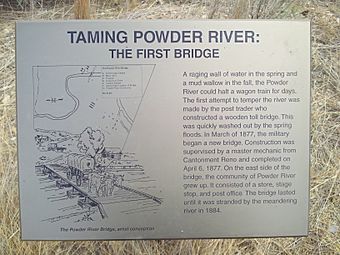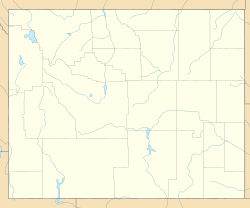Powder River Station-Powder River Crossing facts for kids
Quick facts for kids |
|
|
Powder River Station--Powder River Crossing (48JO134 and 48JO801)
|
|

BLM Sign near Powder River Crossing
|
|
| Location | Johnson County, East of Sussex on east side of Powder River, north side of Dry Fork |
|---|---|
| Nearest city | Sussex, Wyoming |
| Area | 215 acres (87 ha) |
| Built | 1879 |
| Architectural style | Stage station |
| MPS | Bozeman Trail in Wyoming MPS |
| NRHP reference No. | 89000810 |
| Added to NRHP | July 23, 1989 |
The Powder River Crossing is an old settlement in Johnson County, Wyoming. It sits on the east bank of the Powder River. This place became important in the late 1800s.
It started as a simple river crossing point. Later, a wooden toll bridge was built here in 1877. This made it easier for people to cross the river. Soon, a small town grew up around the bridge. It even had a stop for stagecoaches traveling on the famous Bozeman Trail. Today, you can still see old wagon ruts from the pioneer days. These ruts show where countless wagons once passed.
Contents
Cantonment Reno: A Nearby Army Post
The Powder River Crossing was a civilian town. It grew up right across the Powder River from an army camp. This camp was called Cantonment Reno.
Cantonment Reno was built in late 1876. It was about three miles upstream from an even older fort. That older fort was called Fort Reno. It had been built in 1865 but was abandoned in 1868. This happened because of a peace agreement. It was part of the Fort Laramie Treaty of 1868.
By 1878, Cantonment Reno had problems. It didn't have enough wood, food for horses, or water. So, the army decided to move the fort. They moved it to a new place called Fort McKinney. This new fort was about 45 miles northwest. It was near where the town of Buffalo, Wyoming is today. By the end of 1878, most soldiers had left. Only a small group stayed behind. They looked after the empty buildings. They also kept the telegraph station running.
The Busy Stage Stop
The army built a military road and telegraph line. This was along the Bozeman Trail in 1877 and 1878. Soldiers from Cantonment Reno finished a wooden bridge. It was at the Powder River Crossing. This bridge was ready on April 6, 1877.
In April 1879, a company called Patrick Brothers Stage Line started a service. They offered rides three times a week. The route went between Fort Fetterman and Etchetah, Montana. Powder River Crossing was the fifth stop on this route.
On May 13, 1879, the army allowed some old buildings to be used. These were from the abandoned Cantonment Reno. An old store and a cavalry stable were used. They became a store and a place to eat at Powder River Crossing.
An English traveler visited the store in 1880. He wrote about his stay there. He said it was a "deserted Fort." He described the log huts. They were built in a large square. He mentioned that "Frewen's store is in one of them." He also said there were "two or three bedrooms there, rather rough and ready." He slept on blankets without sheets.
In January 1880, another company moved a building. The Rock Creek Stage Company moved a log cavalry stable. It was from the old army camp. They moved it to a spot east of the Powder River. It was along the Dry Fork. They also built other buildings. These included a new stage stop.
The stage station eventually grew. It had a large, long building. This building held a store, a saloon, and living areas. There were also stables and a blacksmith shop. Many old dugout cabins were also there. From 1882 to 1891, William P. Hathaway ran the store and saloon. It was located east of the dry gulch.
Amanda and Horace Brown ran the stage stop. They were there from 1884 to 1887. Amanda Brown wrote about her experiences. Her stories were published in 1958. She said, "We made good money, but I sure worked myself down." She cooked for many people. Sometimes it was ten, sometimes forty. She also did all the washing. She cleaned the rooms and served people. She always had to be ready for a full stagecoach. Sometimes, only the drivers arrived. Many different kinds of people traveled. There were ranchmen, cowboys, gamblers, and even horse thieves.
Amanda Brown said a small community grew. It was around the stage station and an iron bridge. The bridge was built in 1883. There were never more than four families living there. But the town had a store, a post office, and a saloon. In 1892, the Burlington Railroad reached Clearmont, Wyoming. When the train arrived, the stagecoach line was no longer needed.
Why Powder River Crossing Was Left Behind
The post office at Powder River opened on May 22, 1879. John Livingston was the first postmaster.
In 1881, Henry Winter Davis started a ranch. It was called the Spectacle Ranch. This ranch was near where Sussex, Wyoming, is now. The post office from Powder River Crossing moved to Davis's ranch. This happened on October 18, 1895.
The road that went down the Dry Fork was changed. It was rerouted to cross the Powder River at Sussex. This road eventually became Wyoming Highway 192. In 1914, a new bridge was built at Sussex. A new post office was also built there. This new development at Sussex meant the end for Powder River Crossing.
What It Looks Like Today
No one ever claimed the land at Powder River Crossing. It was never settled by homesteaders. Today, the land is owned by the State of Wyoming. It is managed by the Wyoming Office of State Lands and Investments.
You can still see many wagon ruts from the Bozeman Trail. They are spread out near the Dry Fork. Close to these ruts, there is a group of cottonwood trees. This is where the Powder River Station used to be. It's also where Horace Brown ran his eating place.
 | Delilah Pierce |
 | Gordon Parks |
 | Augusta Savage |
 | Charles Ethan Porter |



